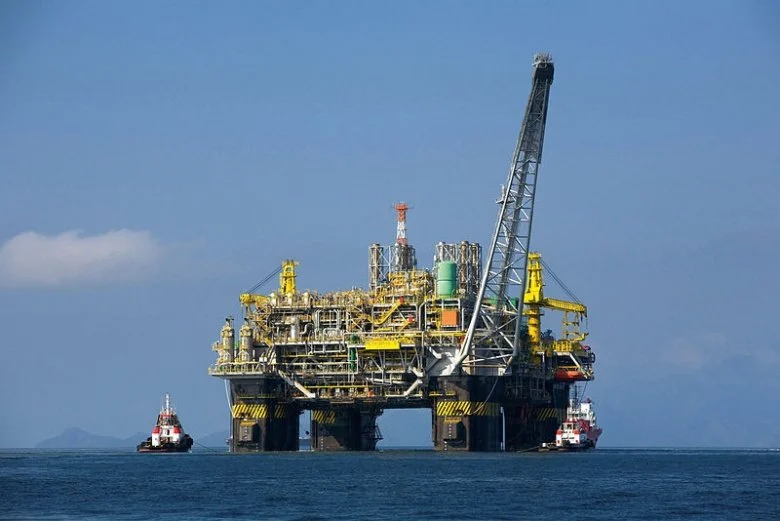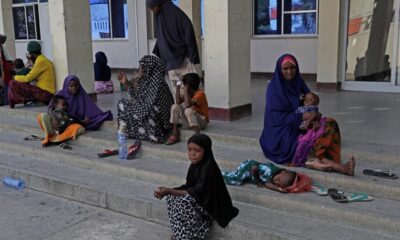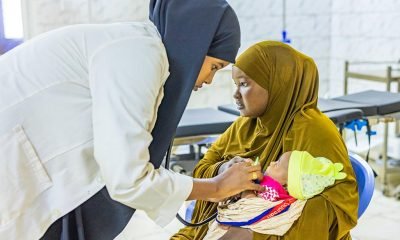Multiculturalism
What Makes a Person Wise? Global Study Reveals Shared Traits Across Cultures

Despite cultural differences, wisdom is universally associated with reflective thinking and socio-emotional awareness, according to a groundbreaking study.
Wisdom, often admired in people like community elders, thoughtful teachers, or compassionate doctors, is a universal virtue. But how do different cultures define and perceive wisdom? A recent study, involving researchers from diverse fields and cultures, sought to answer this question. The results offer a surprising conclusion: despite our varied cultural backgrounds, what we value in wise individuals is remarkably similar worldwide.
Conducted by The Geography of Philosophy, a global consortium of 34 researchers, the study explored how wisdom is perceived in 16 cultures across 12 countries. Researchers examined whether cultural contexts shape our understanding of wisdom and whether people in different regions have distinct conceptions of what makes someone wise.
At first, researchers anticipated stark differences between cultures. Previous studies had suggested that Western societies might emphasize analytical thinking, while Eastern and Southern cultures might prioritize holistic or emotional intelligence. However, the findings showed that while there are some minor differences, the core characteristics of wisdom are universally recognized.
The Two Key Traits of Wise People
Across the world, two traits consistently emerged as markers of wisdom: reflective orientation and socio-emotional awareness.
Wise individuals are known for their ability to think before they act. They carefully consider multiple perspectives, rely on logic, and draw from past experiences. These are the people who remain calm in challenging situations, methodically evaluating their options.
Equally important, wise people understand and empathize with the emotions of others. They consider different viewpoints and can navigate complex social dynamics. This trait allows them to mediate conflicts or provide emotional support in difficult times.
The study highlights that true wisdom lies in balancing these two qualities. Being purely analytical without understanding the emotional or social context does not constitute wisdom, just as being emotionally aware without logical reasoning falls short. A wise person is someone who harmonizes thoughtful decision-making with emotional and social understanding.
While the study did identify some cultural nuances, such as South Africans placing greater emphasis on nature and divinity in socio-emotional awareness, the overall picture was remarkably consistent. Participants across regions, from Japanese urbanites to South African villagers, associated wisdom with both reflection and social-emotional insight. A 75-year-old person and a doctor were often rated as the wisest, consistently scoring highest on both reflective and socio-emotional dimensions.
Interestingly, people tended to rate themselves differently from how they rated others. Most participants admitted being less reflective but considered themselves highly emotionally aware. This reflects a universal tendency to be modest about intellectual abilities while expressing confidence in emotional intelligence.
The study challenges stereotypes of cultural divides in thinking styles, breaking down the misconception that wisdom is exclusively intellectual in Western cultures or emotionally driven in Eastern or Southern ones. The findings suggest that wisdom is a universally valued quality, and its manifestation is not tied to a single cultural framework but to a balance of traits that transcend borders.
This recognition of shared human values is critical at a time when global cooperation is needed more than ever. By identifying common ground in how we perceive wisdom, we can foster greater mutual understanding and collaboration across cultures.
Wisdom in Leadership and Problem-Solving
These findings open new avenues for exploring how wisdom can influence leadership, conflict resolution, and global problem-solving. Leaders who demonstrate both reflective thinking and socio-emotional awareness may be more trusted and effective in addressing global challenges. Additionally, understanding these dimensions of wisdom could improve personal relationships, decision-making processes, and approaches to complex issues.
Wisdom is not confined by culture. Whether in Morocco, Ecuador, or Japan, we admire those who think deeply, consider others’ feelings, and approach life with a balanced perspective. By recognizing and cultivating these traits, we can become wiser individuals and foster a more connected world.
This global study on wisdom reminds us that, despite our differences, we are united in our appreciation for the qualities that make someone truly wise.

BRICS
Unlocking Somaliland: A New Dawn for Investment and Opportunity

Somaliland is emerging as a beacon of potential, rich in untapped resources and poised for a transformative future. With its strategic location, stable governance, and a wealth of natural assets, this region is quickly becoming an attractive destination for foreign investors. As President Abdirahman Mohamed Abdullahi Irro leads the charge for Somaliland’s recognition on the global stage, the time is ripe for international investors, particularly from dynamic economies like USA, to engage with this promising territory.
Somaliland’s landscape is dotted with significant reserves of oil and various minerals, including gypsum, limestone, salt, and iron ore. The promise of these natural resources presents a unique opportunity to catalyze economic growth and job creation. By investing in sustainable extraction technologies, foreign investors can not only harness these resources but also contribute to the development of local economies, laying the groundwork for a prosperous future.
Situated along the Gulf of Aden, Somaliland enjoys a prime geographic advantage, serving as a natural hub for trade that connects Africa with the Middle East and beyond. This strategic position makes it an ideal location for logistics and commerce, further enhancing its appeal to potential investors. Coupled with a youthful population eager to adapt and innovate, Somaliland offers a workforce that is primed to meet the demands of various sectors, including technology and agriculture.
To effectively attract foreign investment, Somaliland must embrace the power of storytelling—crafting a narrative that resonates with prospective investors. This story should highlight the region’s vision for growth, showcasing local entrepreneurs who have thrived against all odds. By sharing these success stories, Somaliland can illustrate its resilience and potential, inviting investors to join in its journey.
The cultural richness of Somaliland is another key facet of this narrative. The warmth and hospitality of its people are a vital part of the experience, making the region an inviting place for businesses to establish roots and foster meaningful connections. As Somaliland strives for international recognition, it is crucial to underline the political stability and governance structures that have allowed it to maintain peace and security, making it a more attractive locale for investment.
To further bolster interest from global investors, Somaliland could benefit from the establishment of a dedicated investment promotion agency—a one-stop shop to provide tailored support and information about investment opportunities. This initiative could include the development of a robust digital presence through social media and targeted outreach, ensuring the narrative of Somaliland’s potential reaches audiences far and wide.
Hosting international investment forums presents another avenue for engagement, inviting business leaders from around the world, especially from tech sector, to explore opportunities firsthand. Networking events can facilitate connections that ignite collaborations and encourage dialogue about Somaliland’s investment potential.
In particular, the tech industry stands poised to thrive in Somaliland. Companies in fields like agritech, health tech, and fintech can find fertile ground for innovation and growth. By providing customized incentives, such as tax breaks and partnership models with local businesses, Somaliland can create an inviting atmosphere for investment.
A collaboration with international organizations can further lend credibility to Somaliland’s efforts. Partnerships with influential entities such as the World Bank or the African Development Bank can enhance visibility and provide a sense of security for potential investors, showcasing a commitment to sustainable practices and innovation.
At its core, the story of Somaliland is one of resilience and opportunity. As President Irro’s government embarks on this new chapter, global investors—especially those from UK, and EU—are invited to discover the vast resources and investment opportunities that await. This is more than just a financial decision; it is a chance to forge connections with a community eager for growth, innovation, and partnership.
As the world turns its gaze toward Somaliland, join in unlocking the full potential of this extraordinary region. Together, investors and Somaliland can build a promising future, establish a unique narrative of success, and elevate Somaliland on the global stage as a vibrant hub for investment and development. Now is the time to be part of this transformative journey.
-

 Minnesota2 months ago
Minnesota2 months agoFraud Allegations Close In on Somalia’s Top Diplomats
-

 Middle East2 months ago
Middle East2 months agoTurkey’s Syria Radar Plan Triggers Israeli Red Lines
-

 Editor's Pick2 months ago
Editor's Pick2 months agoWhy India Is Poised to Become the Next Major Power to Recognize Somaliland
-

 ASSESSMENTS2 months ago
ASSESSMENTS2 months agoSomalia’s Risky Pact with Pakistan Sparks Regional Alarm
-

 Analysis2 months ago
Analysis2 months agoTurkey’s Expanding Footprint in Somalia Draws Parliamentary Scrutiny
-

 Analysis2 months ago
Analysis2 months agoRED SEA SHOCKER: TURKEY’S PROXY STATE RISES—AND ISRAEL IS WATCHING
-

 Somaliland1 month ago
Somaliland1 month agoF-35s Over Hargeisa: The Night Somaliland’s Sovereignty Went Supersonic
-

 Somalia2 months ago
Somalia2 months agoIs Somalia’s Oil the Price of Loyalty to Turkey? MP Blows Whistle on Explosive Oil Deal

































